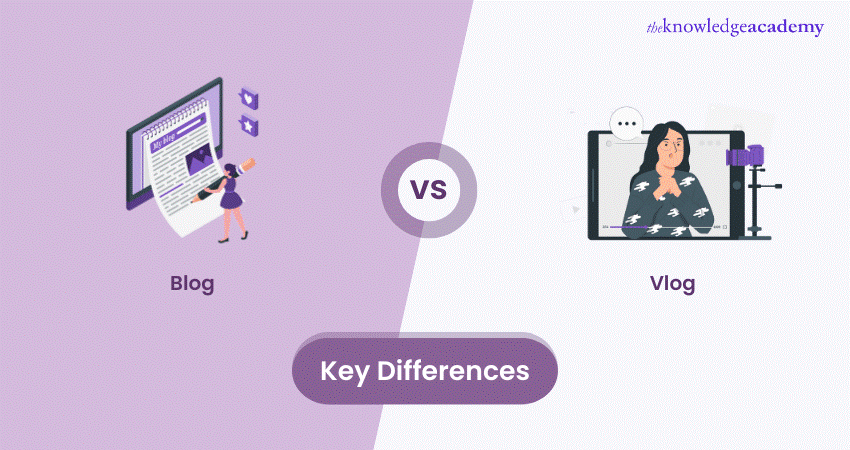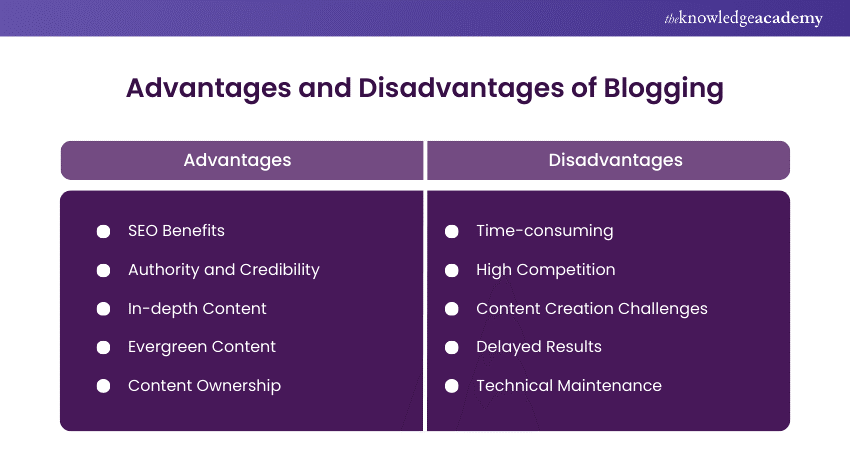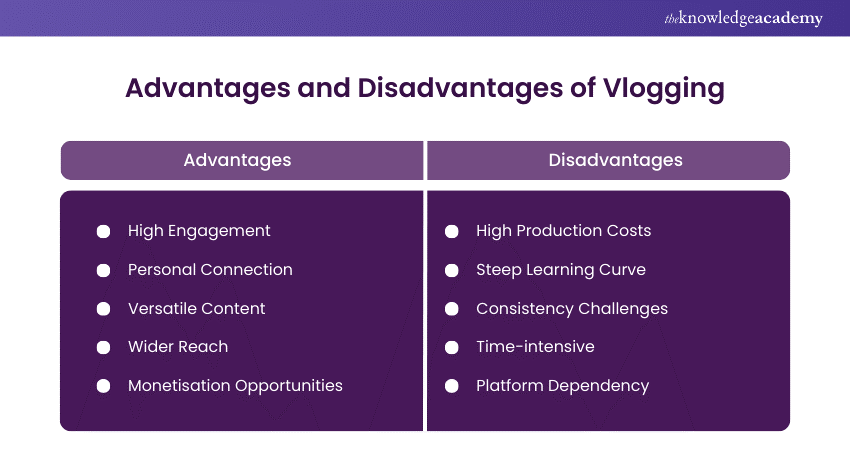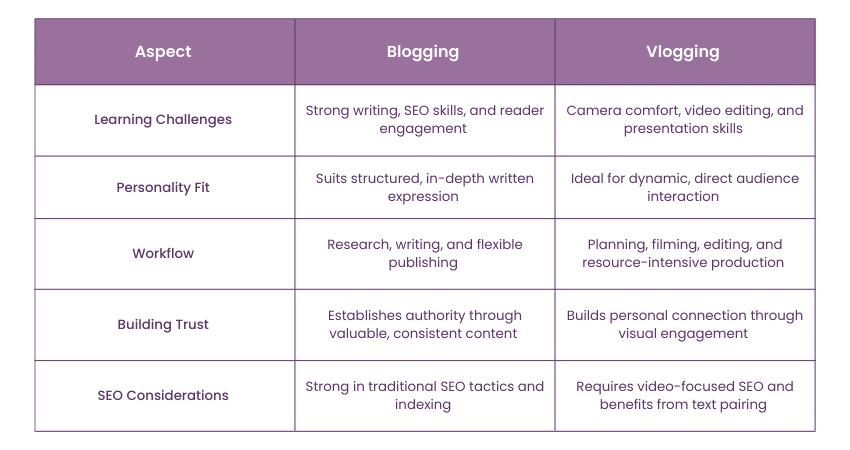We may not have the course you’re looking for. If you enquire or give us a call on 01344203999 and speak to our training experts, we may still be able to help with your training requirements.
Training Outcomes Within Your Budget!
We ensure quality, budget-alignment, and timely delivery by our expert instructors.

Are you someone who thrives on crafting detailed narratives, or do you prefer to engage with your audience face-to-face, through the lens of a camera? Choosing between a Blog and a Vlog isn’t just about what’s trending - it’s about finding the right medium to tell your story. By understanding the differences between Blog vs Vlog, you can significantly enhnace your brand’s reach and engagement.
So, where do you begin? In this Blog, we’ll dive deep into the Blog vs Vlog debate, exploring the unique strengths and potential pitfalls of each format. Are you ready to turn your content into a magnet for your audience? Let’s dive in and make your brand unforgettable!
Table of Contents
1) What is a Blog?
2) What is a Vlog?
3) Key Difference Between Blog and Vlog
4) Tips for Success: Whether You Choose a Blog or a Vlog
5) Conclusion
What is a Blog?
A Blog is a website or section of a website where individuals or businesses regularly publish articles, also known as Blog posts. Blog posts can range from personal stories to industry insights, typically written in an informal, conversational style. Blogs serve as a platform for sharing knowledge, opinions, and updates with a target audience. They can be a powerful tool for building brand authority and driving website traffic.
The primary purpose of a Blog is to provide valuable content that resonates with readers. This content can take various forms, including how-to guides, product reviews, opinion pieces, news updates, and more. By consistently publishing high-quality content, Blogs can attract and retain readers, establish a brand’s authority, and ultimately drive conversions.
Advantages and Disadvantages of Blogging
When considering whether to start a Blog for your brand, it’s important to weigh both the advantages and disadvantages to determine if it aligns with your business goals and resources.

Advantages:
a) SEO Benefits: Blogging improves search engine visibility by regularly publishing keyword-rich content boosting organic traffic through well-optimised posts and internal linking.
b) Authority and Credibility: Consistent, valuable content establishes your brand as an industry authority, building trust and loyalty among your audience.
c) In-depth Content: Blogs allow for detailed exploration of topics, offering comprehensive guides and tutorials that educate your audience and solve their problems.
d) Evergreen Content: Blog posts have lasting value, driving traffic and generating leads over time. Regular updates keep the content fresh and relevant.
e) Content Ownership: Blogging on your website gives you full control over your content, free from the constraints of external platforms.
Disadvantages:
a) Time-consuming: High-quality Blogging requires significant time and effort for content creation, SEO optimisation, and promotion, challenging for businesses with limited resources.
b) High Competition: With millions of Blogs, standing out requires exceptional content and effective promotion, making it difficult to gain traction in crowded niches.
c) Content Creation Challenges: Writing well-researched, engaging content demands strong writing skills and creativity, which can be daunting for those less inclined to write.
d) Delayed Results: Blogging typically produces long-term results, taking months or years to yield significant traffic and conversions, unsuitable for quick wins.
e) Technical Maintenance: Managing a Blog involves technical upkeep, including hosting, design, security, and regular updates, which can be burdensome without technical expertise.
What is a Vlog?
A Vlog, short for “video Blog,” is a type of content where the creator shares information, opinions, or experiences through video. Vlogs are typically hosted on platforms like YouTube, Vimeo, or social media channels, where they can reach a broad audience. Vlogs can cover a wide range of topics, from personal stories to product reviews, tutorials, and industry insights.
The primary purpose of a Vlog is to connect with an audience on a more personal level. Through video, Vloggers can showcase their personality, tone, and body language, creating a stronger connection with viewers. This format is ideal for brands aiming to build trust and authenticity through direct, humanised interactions with their audience:
Advantages and Disadvantages of Vlogging
When deciding whether Vlogging is the right strategy for your brand, it’s crucial to consider both its advantages and disadvantages. This will help ensure it aligns with your goals and capabilities.

Advantages:
a) High Engagement: Vlogs capture audience attention through visual storytelling, leading to higher engagement rates compared to text-based content.
b) Personal Connection: Vlogging allows brands to showcase personality and authenticity, fostering stronger, more personal connections with viewers.
c) Versatile Content: Vlogs offer flexibility in content creation, ranging from tutorials and product demos to behind-the-scenes footage and interviews.
d) Wider Reach: Video content is highly shareable and often prioritised by algorithms, increasing the potential to reach a broader audience.
e) Monetisation Opportunities: Vlogs provide various revenue streams, such as ad revenue, sponsored content, and affiliate marketing, making it a lucrative option for content creators.
Disadvantages:
a) High Production Costs: Producing quality Vlogs requires investment in equipment, editing software, and sometimes professional services, leading to higher upfront costs.
b) Steep Learning Curve: Vlogging demands skills in video production, editing, and on-camera presentation, which can be challenging for beginners.
c) Consistency Challenges: Regularly producing engaging Vlogs can be time-consuming and resource-intensive, making it difficult to maintain consistency.
d) Time-intensive: From planning to editing, creating a Vlog involves a significant time investment, which can be a drawback for brands with limited resources.
e) Platform Dependency: Vlogging often relies on third-party platforms like YouTube, making content subject to algorithm changes and platform policies that can impact visibility and reach.
Key Difference Between Blog and Vlog
Now that we’ve explored the advantages and disadvantages of both Blogging and Vlogging let’s delve into the key differences between these content formats. These differences can help you determine which option aligns best with your brand’s goals and resources.

1) Learning Challenges
Blogging and Vlogging each come with their own set of learning challenges. For Blogging, the primary hurdles involve developing strong writing skills, mastering SEO techniques, and understanding how to engage readers through text. Writing engaging content requires practice and optimising it for search engines adds an additional layer of complexity.
On the other hand, Vlogging requires a different skill set. You’ll need to become comfortable in front of the camera, learn video editing, and understand the basics of sound and lighting. For many, the steepest learning curve is mastering the art of on-camera presentation - knowing how to speak confidently, engage viewers, and convey your message effectively through video.
2) Personality Differences
Your personality and brand voice play a significant role in determining whether Blogging or Vlogging is a better fit. Blogging is ideal for those who express themselves better through writing, enjoy crafting detailed narratives, and prefer a more structured approach to content creation. It allows for thoughtful, in-depth analysis and caters to an audience that appreciates detailed written content.
Vlogging suits those who are camera-friendly, enjoy direct audience engagement and prefer a spontaneous, dynamic communication style. Vlogs are more personal and allow for the expression of personality in ways that text alone cannot convey. If you’re energetic, outgoing, and enjoy connecting with your audience visually and verbally, Vlogging may be the better choice.
3) Workflow Variations
The workflow for Blogging versus Vlogging can differ significantly. Blogging typically involves research, writing, editing, and publishing. It’s a process that allows for more flexibility in terms of pacing - Bloggers can write and edit at their own speed, and the process can be done from almost anywhere.
Vlogging involves a complex workflow, including planning, scripting, shooting, editing, and promoting. Each stage requires different tools and skills. The process is time-consuming and resource-intensive. It often demands a dedicated filming space, good lighting, and quality audio equipment to ensure a professional final product.
4) Building Expertise and Trust
Both Blogs and Vlogs can be effective tools for building expertise and trust, but they do so in different ways. Blogging builds trust over time by consistently delivering valuable written content that helps solve problems or provides insights. Readers rely on your Blog for in-depth information and expert opinions, establishing your brand as a niche leader.
Vlogging builds trust through a personal connection. Seeing the person behind the brand, hearing their voice, and observing their body language can create a sense of familiarity and authenticity. Vlogs allow viewers to get to know you on a more personal level, which can be particularly effective for brands that rely on building strong relationships with their audience.
5) SEO Considerations
SEO plays a crucial role in the success of both Blogs and Vlogs, but the strategies for optimising each are different. Blogging offers more opportunities for traditional SEO Tactics, such as keyword optimisation, meta descriptions, internal linking, and long-tail keyword targeting. Search engines can easily crawl and index text content, making it easier for Blogs to rank in search results.
Vlogs require a different SEO approach, focusing on video titles, descriptions, tags, thumbnails, and engagement metrics. Platforms like YouTube favour engaging videos, but videos aren't easily indexed by traditional search engines. Pairing Vlogs with strong text components, like Blog posts or transcripts, improves visibility.
Join the Blogging Course to elevate your skills, grow your audience, and achieve Blogging success!
Tips for Success: Whether You Choose a Blog or a Vlog
Choosing between a Blog and a Vlog is just the first step. Whatever format you choose, strategic content ensures it resonates with your audience and meets your brand's goals.
When to Choose a Blog?
The following are the ideal scenarios for choosing a Blog:
a) Strong Writing Skills: If you’re confident in writing and can effectively communicate ideas through text, Blogging is ideal. It allows for in-depth topic exploration and showcases your brand's voice.
b) Focus on SEO: Blogging is excellent for improving search engine rankings. With the right strategy, Blogs can drive significant organic traffic.
c) Targeting Niche Audiences: Blogging is effective for reaching niche audiences seeking detailed information. It helps connect with your audience through relevant content.
d) Flexible Schedule: Blogging offers flexibility in content creation, allowing you to work on your schedule.
e) Evergreen Content: Blogs provide lasting value by generating traffic over time. Evergreen posts remain relevant and continue attracting readers long after publication.
When to Choose a Vlog?
The following are ideal scenarios for choosing a Vlog:
a) When You Enjoy Being on Camera: If you’re comfortable on camera and enjoy direct audience interaction, Vlogging is the best choice. It lets you showcase your personality and connect personally with viewers.
b) When You Want to Leverage Visual Storytelling: Vlogs are perfect for brands with visual stories to tell. Whether it’s product demos, tours, or behind-the-scenes looks, videos bring your brand to life in ways text cannot.
c) When You’re Targeting a Broad Audience: Vlogging helps you reach a wider audience, particularly younger demographics or those who prefer video content. With the right content, your videos can go viral and significantly boost brand visibility.
d) When You’re Focused on Engagement: If your goal is audience engagement and community building, Vlogging is powerful. Videos typically generate more comments, shares, and interaction, fostering a loyal audience.
When You’re Ready to Invest in Production: If you have the resources and are willing to invest in quality production, Vlogging offers a significant return on investment. High-quality videos enhance your brand’s image and attract viewers who appreciate professional content.
Master the art of persuasive writing with our Copywriting Course —elevate your brand's voice today!
Conclusion
In the Blog vs Vlog debate, the best choice depends on your brand’s goals and audience. Blogs excel at delivering in-depth, SEO-friendly content, while Vlogs create personal connections through engaging videos. Evaluate your strengths and resources to choose the format that will most effectively elevate your brand.
Elevate your marketing game by exploring our Digital Marketing Courses and become the digital strategist your brand needs!
Frequently Asked Questions

No, a Blogger focuses on creating written content, typically in articles or posts. On the other hand, a Vlogger creates video content, engaging audiences through visual storytelling on platforms like YouTube or social media.

A Blog's length depends on the depth and detail of the topic. Similarly, a Vlog can vary in duration, ranging from brief clips to longer videos based on content needs.

The Knowledge Academy takes global learning to new heights, offering over 30,000 online courses across 490+ locations in 220 countries. This expansive reach ensures accessibility and convenience for learners worldwide.
Alongside our diverse Online Course Catalogue, encompassing 19 major categories, we go the extra mile by providing a plethora of free educational Online Resources like News updates, Blogs, videos, webinars, and interview questions. Tailoring learning experiences further, professionals can maximise value with customisable Course Bundles of TKA.

The Knowledge Academy’s Knowledge Pass, a prepaid voucher, adds another layer of flexibility, allowing course bookings over a 12-month period. Join us on a journey where education knows no bounds.

The Knowledge Academy offers various Digital Marketing Courses, including Blogging Course, Vlogging Course, SEO Course, Influencer Marketing Course and YouTube Marketing Course. These courses cater to different skill levels, providing comprehensive insights into Social Media Influencer.
Our Digital Marketing Blogs cover a range of topics related to Blogging, offering valuable resources, best practices, and industry insights. Whether you are a beginner or looking to advance your Digital Marketing skills, The Knowledge Academy's diverse courses and informative Blogs have got you covered.
Upcoming Digital Marketing Resources Batches & Dates
Date
 Blogging Course
Blogging Course
Fri 24th Jan 2025
Fri 28th Mar 2025
Fri 23rd May 2025
Fri 25th Jul 2025
Fri 26th Sep 2025
Fri 28th Nov 2025







 Top Rated Course
Top Rated Course




 If you wish to make any changes to your course, please
If you wish to make any changes to your course, please


